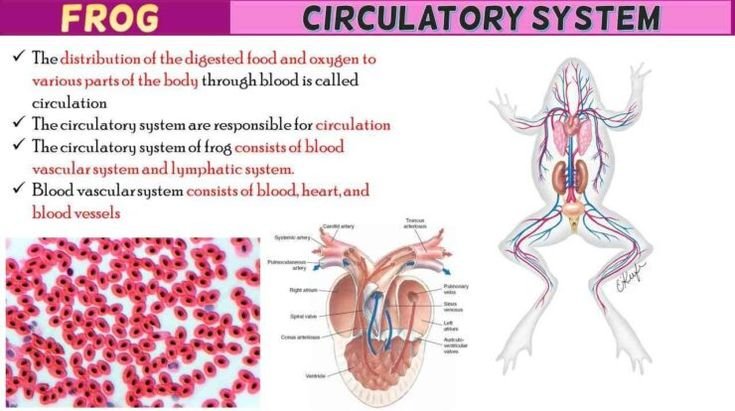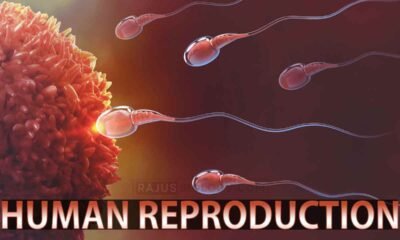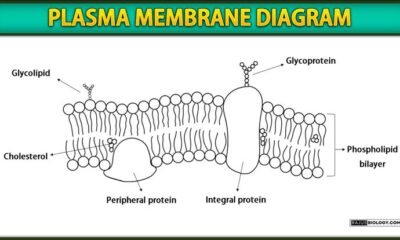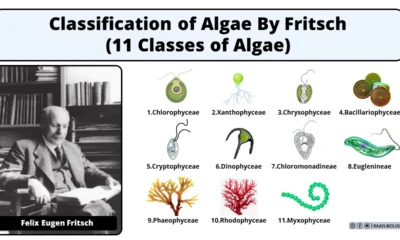Blog
Frog Circulatory System Short Notes | Free Biology Notes

In this article we will discuss about the frog circulatory system
Frog Circulatory System
- The distribution of the digested food and oxygen to various parts of the body through blood is called circulation
- The frog circulatory system are responsible for circulation
- The frog circulatory system consists of blood vascular system and lymphatic system.
- Blood vascular system consists of blood, heart, and blood vessels
Blood
- It is a liquid connective tissue containing fluid plasma and blood cells
- Plasma composed of 90% water and 10% of organic and inorganic substances
- Three type of blood cells are present in it
- RBC: RBC are oval or biconvex in shape and nucleated. It contains haemoglobin which carry the oxygen.
- WBC: This cell provide protection or immunity.
- Thrombocytes: This cell prevent loss of blood by forming thrombus or clots on the bleeding site.
Heart
- The heart is muscular and triangular pumping organs
- A thin, transparent, two-layered pericardium encloses the heart.
- The frog consists of three chambered heart
- Upper two chambers are called auricle and lower one chamber is called ventricle
Auricles
- There are two auricles, left and right
- The left auricle is smaller than the right
- Sinus venosus opens into dorsal wall of the right auricle through the sinu auricular aperture
- The common pulmonary vein opens into left auricle
- Both auricles open into ventricles by a common large auriculo ventricular aperture
Ventricle
- The ventricle has thick muscular and spongy wall
- The opening of ventricle into truncus anteriosus is guarded by three semilunar values, which prevent the back flow of blood from truncus arterious into ventricle
- On contraction of the ventricle blood flow from the ventricle into truncus anteriosus
- Truncus anteriosus divided into two trunks called ventral aorta
- Each ventral aorta further divided into a carotid arch, systemic arch and a pulmocutaneous arch
- The hearts of frog have two additional chambers: truncus arteriosus and sinus venosus.
Truncus arteriosus
- Tube shaped structure that arises from the right side of the ventricle.
- Anterior end of these structures, there is a division into two trunks called ventral aorta
- The spiral valves in amphibians are present within the truncus arteriosus
Sinus venosus
- Thin walled and triangular chamber
- Three veins open into sinus venosus: right precaval, left precaval and post caval veins
- Sinus venosus open in the right auricle
- Impure blood from all body parts is poured into the sinus venosus
- It further pours this impure blood into the right auricle
Blood vessels (arterial system)
- Arteries carry blood away from the heart
- Arterial system starts with truncus arteriosus
- The truncus divides into left and right branches and each of these branches subdivide into three major vessels or aortic arches
- Common carotid artery to head
- Systemic artery to body and viscera
- Pulmocutaneous artery to lung and skin
How Circulatory System Works In Frog?
- Sinus venosus contracts, its impure blood is pumped into the right auricle through sinu auricular aperture
- At the same time the left auricle receives blood from the lungs via pulmonary veins.
- Both auricles contract almost simultaneously driving blood into the ventricle through the auriculo ventricular aperture
- Completely mixed blood in ventricle
- The truncus which flows simultaneously through the three pairs of arches to all parts of the body

 Blog8 months ago
Blog8 months ago[PPT] Human Reproduction Class 12 Notes
- Blog8 months ago
Contribution of Indian Phycologists (4 Famous Algologist)
- Blog8 months ago
PG TRB Botany Study Material PDF Free Download

 Blog8 months ago
Blog8 months agoCell The Unit of Life Complete Notes | Class 11 & NEET Free Notes

 Blog8 months ago
Blog8 months ago[PPT] The living world Class 11 Notes

 Blog8 months ago
Blog8 months agoPlasma Membrane Structure and Functions | Free Biology Notes

 Blog8 months ago
Blog8 months agoJulus General Characteristics | Free Biology Notes

 Blog8 months ago
Blog8 months agoClassification of Algae By Fritsch (11 Classes of Algae)













